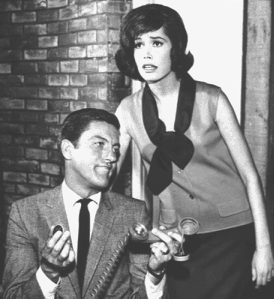The sixties and the evolution of liberalismTwo years ago I came across this fascinating article by Bruce Bawer in
The Wilson Quarterly:
The Other Sixties, about that brief era wedged between the ostensibly mindless conformity of the 1950s and the turbulent "Sixties", with its drug culture, angry anti-war protests, and aggressive student rebellion against authority. The early 1960s roughly corresponds to the
John F. Kennedy administration in the United States and its immediate aftermath, a time of idealism, a sophisticated blend of high and middle-brow culture, and widespread expectations for the efficacy of a variety of liberal reforms. It was the era of Kennedy's New Frontier, the
Peace Corps, the New Math, and the quests to reach (literally) for the moon, to combat poverty and to end racial discrimination.
Pope John XXIII headed the Roman Catholic Church, and the Second Vatican Council was bringing the winds of change into an ancient institution. Almost simultaneously European colonialism in Africa and elsewhere was being wound down, with high hopes expressed for these newly liberated nation-states. Setting the tone for the arts and entertainment were
Jack Paar and
The Dick Van Dyke Show on that still new medium of television; Leonard Bernstein's classic musical play,
West Side Story;
Julia Child's popularization of continental cuisine in a meat-and-potatoes culinary culture; and the fashionable Kennedies themselves. Films like
The Apartment and
Breakfast at Tiffany's began quietly to break sexual taboos, and Alfred Hitchcock's deliberately shocking
Psycho marked a departure from his string of suspense hits of the previous decade.

Bawer's essay is less an analysis than a compelling evocation of an era marked at once by innocence and sophistication. As someone whose elementary school years coincided with this period, I believe he has done a good job of conveying to a contemporary audience something of its feel. Indeed
Dick Van Dyke was (and remains) one of my favourite television shows, even if my juvenile mind did not quite grasp all of its humour at the time. I well recall the arrival of the New Math and other innovations in my own educational experience. Long before PowerPoint, overhead projectors were a fresh and exciting way to communicate knowledge to youngsters. Then there were Dr. Martin Luther King and the civil rights movement. Although my parents were moderately conservative Republicans — this was, after all,
DuPage County, Illinois — I recall being told by them that those seeking equal rights for black Americans were unequivocally in the right. I have few memories of the
Cuban Missile Crisis as such, but I do recall the global tensions characterizing the Cold War era and wondering whether my siblings and I would live to see adulthood. The idealism of the era was thus tempered by a vague and unprecedented fear for the future — a fear that at any moment our whole world might evaporate in a terrifying flash.
All of this began to change with Kennedy's assassination on friday, 22 November 1963, an event that marked a watershed for our generation. After that things were never quite the same. As I reached puberty a few years later, race riots were marring the landscapes of the major urban centres, and university students were protesting an Asian war that dragged on with no evident larger purpose. The sexual revolution unnervingly coincided with my own attainment of sexual maturity, and the entire culture seemed to be conspiring against the virtue of chastity, especially in the young. Rock music took on an increasingly hard edge, hair grew longer, and school dress codes went out the window as "nonconformist" young people donned the ubiquitous and standardizing blue jeans. The idealistic world in which I had been raised had been quickly supplanted by one where, despite the hope that "
peace will guide the planets and love will steer the stars," a bohemian ethos of "do your own thing" made the defenders of social institutions and their larger public purposes appear hopelessly "square." Bawer ends his article with the summer of 1967 and the hippies in Tompkins Square Park in New York — a poignant glimpse into the next era.

While Bawer's portrait of the early 1960s is unabashedly nostalgic, James Piereson has a much less rosy portrait of the period and its immediate aftermath:
Lee Harvey Oswald and the Liberal Crack-Up. Oswald was, of course, Kennedy's assassin, and Piereson argues that this professed communist and Castro sympathizer did more than anything else to discredit the moderate liberal reformism characterizing what would shortly come to be called "Camelot." The irony for Piereson is that many of the young who had been so enthralled by Kennedy's vision of a New Frontier would come a few years later to espouse doctrines not dissimilar to those animating his murderer under the guise of the New Left. Furthermore, while prior to 1963 liberalism in some fashion seemed to be in the ascendancy in the United States, with conservatism being relegated to the cranky right, the distortions of the late sixties and early seventies produced a reactive response that led to the rise of a new conservatism, initially under President Richard Nixon with his famous "
silent majority," and eventually under Ronald Reagan after 1980. By the 1990s and into the first years of the 21st century the United States appeared to be permanently divided in a culture war between "red states" and "blue states," thus mirroring a much earlier development in the European continent following the French Revolution. The seeming liberal consensus of the early sixties had been replaced by hardened divisions over a host of issues, including abortion, marriage and homosexuality.
None of this could have been predicted in 1960. At that time the old New Deal coalition was still largely intact, although southern whites' loyalty to the Democratic Party was definitely eroding over racial segregation and civil rights. This coalition revolved largely around concrete economic issues — the very issues that had served to define the political landscape since the onset of the Great Depression a generation earlier. By this time the Republican Party had gained its reputation as the party of the "haves" and the Democratic Party was perceived to champion the "have nots." The industrial economy that had begun after the Civil War still characterized much of American life. A few miles from where I grew up the
Elgin National Watch Company's factory was still standing and producing watches, as it had for nearly a century. In nearby Villa Park, the
Ovaltine Company's plant was still producing its famous egg and malt-based beverage for the country. And the
Union Stock Yard on the southwest side of Chicago continued to supply much of the meat that fed the region. Moreover, the country's transportation infrastructure still revolved around the railways, which fanned out in all directions from America's Second City. Famous passenger trains such as the
Twentieth Century Limited and the
Super Chief still rolled down the tracks towards their destinations.

By the middle of the decade all this was clearly changing. The Elgin Watch factory closed in 1965. Rail passenger service was mostly discontinued by the end of the decade, until Amtrak picked up the remnants in 1971. By the 1970s much of the old industrial infrastructure was, if not entirely gone, at least fading in significance for the larger economy, as increasing numbers of Americans found themselves employed in the growing service industries. So-called post-material values took over the two major political parties, especially the Democrats. By 1972 the transition was nearly complete. Once I had reached high school I was aware of living in a different world than the one I was born into. So much had things changed that the 1973 film
American Graffiti could wax nostalgic about an era only a decade in the past. What had happened and why?
Francis Fukuyama argues, in
The Great Disruption, that there is a causal connection between the changing economy and the changing social mores, with the former mostly effecting the latter. While this may not be precisely a marxist argument, it certainly shares with Marx the conviction that man is
homo faber, man the producer, with concrete productive forces fuelling social and political change. In this account the shift from the industrial to the service economy in the 1960s disrupted the social mores that had held sway from the middle of the 19th century, leading in the short run to higher rates of out-of-wedlock births, higher crime rates and drug abuse, on the negative side, but at the same time expanded opportunities for minorities and women, and an increasing environmental awareness, on the positive side. Fukuyama's undergirding argument is historicistic in that it assumes that social mores are dependent on and appropriate to a particular stage in the productive process.
While I would not deny the material motives that Fukuyama points to, I myself have come to think that what happened four decades ago was in large measure due to the arrival of a crucial moment in the development of the liberal project that had begun in the 17th and 18th centuries. In my
Political Visions and Illusions I trace the
development of liberalism through five stages, beginning with the Hobbesian commonwealth, through the night watchman state, the regulatory state and the equal-opportunity state and finally to the choice-enhancement state. My argument is that the cultural shifts of the 1960s marked the transition between the fourth and fifth stages — from a focus on the expansion of material opportunities through state intervention to an emphasis on expanding the human capacity to choose, period. In the choice-enhancement state, government undertakes to maintain a benign neutrality towards a variety of personal lifestyle choices, ostensibly on the grounds of freeing individuals from oppressive constraints on their freedom. Hence Pierre Trudeau could claim that the state has no business in the bedrooms of the nation, a conclusion difficult to contest on the surface. Yet personal choices are not without consequences, not only for the individuals themselves but also for their immediate and extended communities. These consequences are by no means equal in their impact on the larger society, with some more evidently diminishing of human flourishing than others. Therefore, in order to maintain the illusion of equality of lifestyle choices, the state is called upon to compensate for these unequal consequences by means of the very welfare state programmes established during the previous stage of liberalism for different reasons.
Could Bawer's "other sixties" simply have been the high water mark, not of liberalism per se, but of liberalism's fourth stage, in which adherents believed it possible to bring its larger project to culmination while limiting the full working out of its inner logic? If so, then what happened in the mid to late sixties represented not really an abandonment of liberalism but the opening of a cleavage between those who wanted to push its logic further still (the radicals, hippies, &c.) and those who sought to return to an earlier stage of liberalism (the so-called conservatives). Because the conservatives were merely reactive and sought to turn back the clock on the liberal project rather than to posit a genuine alternative, they could never manage to secure a victory against a liberalism whose undergirding assumptions they themselves in large measure shared. Bawer's nostalgia notwithstanding, the "other sixties" could never have been but
one brief, shining moment.












